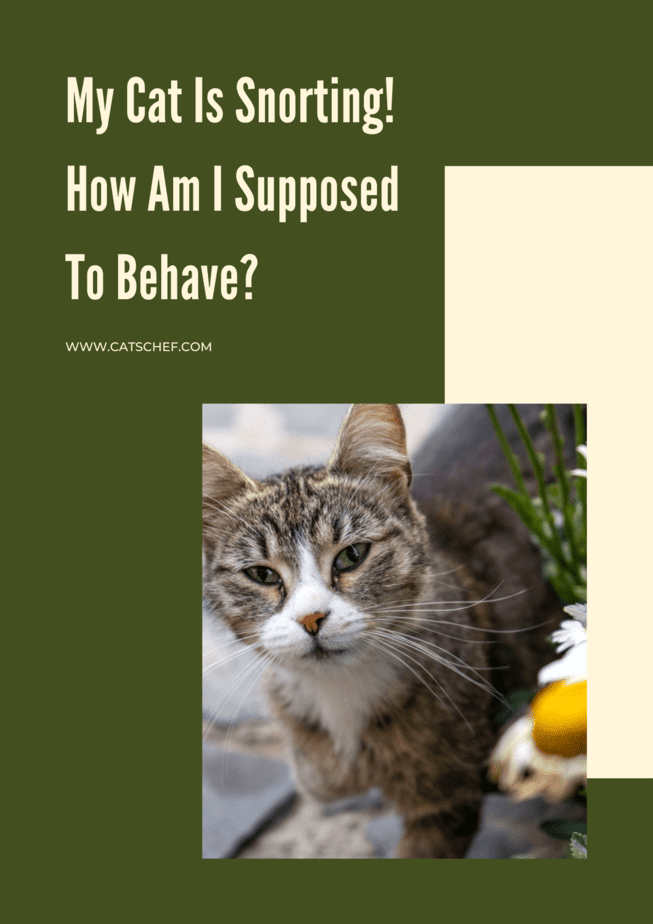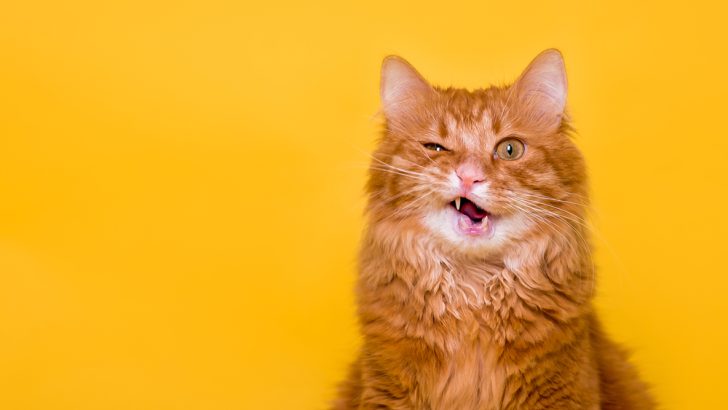Hey guys, it’s me again. Today I’m going to write you more about why is your cat snorting. Have you heard that before? You know, that loud, unpleasant sound that makes you wonder if your feline is struggling for her life? Exactly, we’ll talk about it today.
First of all, don’t be so afraid. I know it sounds super scary, but I promise it’s not always a bad thing. For some cats, it’s completely normal, others probably have some minor issues with hairballs. Just take it easy and calmly figure out what’s going on.
Think about it this way. When you’re eating, sometimes a little crumb goes in the wrong direction and you’re trying to cough it out. In drastic situations, tears start streaming down your face and you’re gasping for air. Isn’t this familiar? Chances are the same thing probably caused snorting for your furbaby.
I know that you want to be a responsible pet owner and react on time so you could prevent serious problems. In order to help you with that, I’ll stop rambling now and get to the point. So, why is your cat snorting? Any ideas?
Why is my cat snorting?
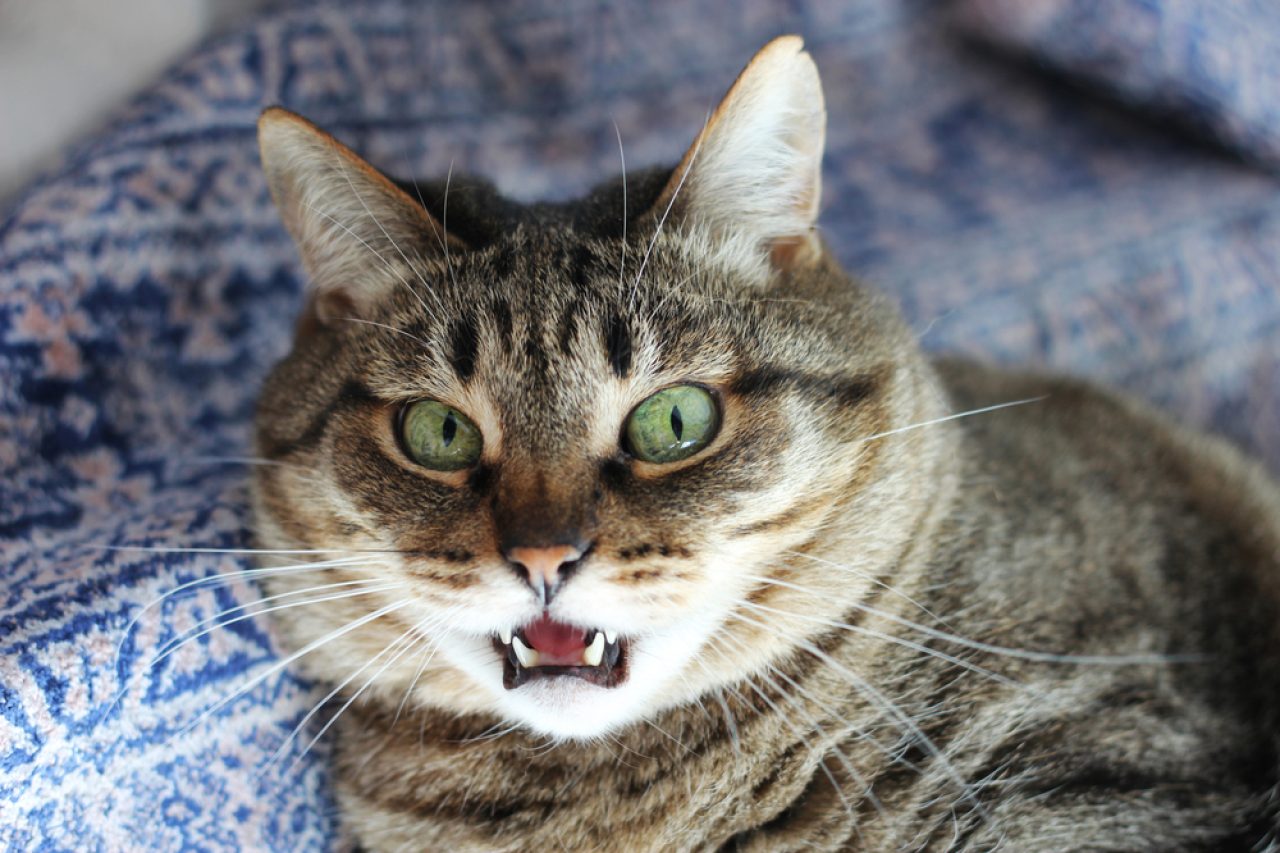
You don’t have to be extremely creative and use your imagination to extremes when you think about the reasons why is your cat snorting. In most cases, it’s simple – something is blocking her airways and she wants to get rid of that. Therefore, she’ll push the air out through her nose and mouth.
We can describe this as if partial obstruction of her nasal passage or the trachea happened. When your cat is snorting, she’s trying to remove foreign objects and allergens from her respiratory system. She may also warn predators and her opponents this way too.
One of the confusing things is that when your cat is sneezing, she makes a similar sound. But, unlike sneezing which is something cats can’t control, snorting is, most of the time, their natural reaction to eliminate what’s bothering them.
Without further ado, let’s go through all the reasons your furbaby is doing this weird thing.
1. Relax, it’s in her DNA
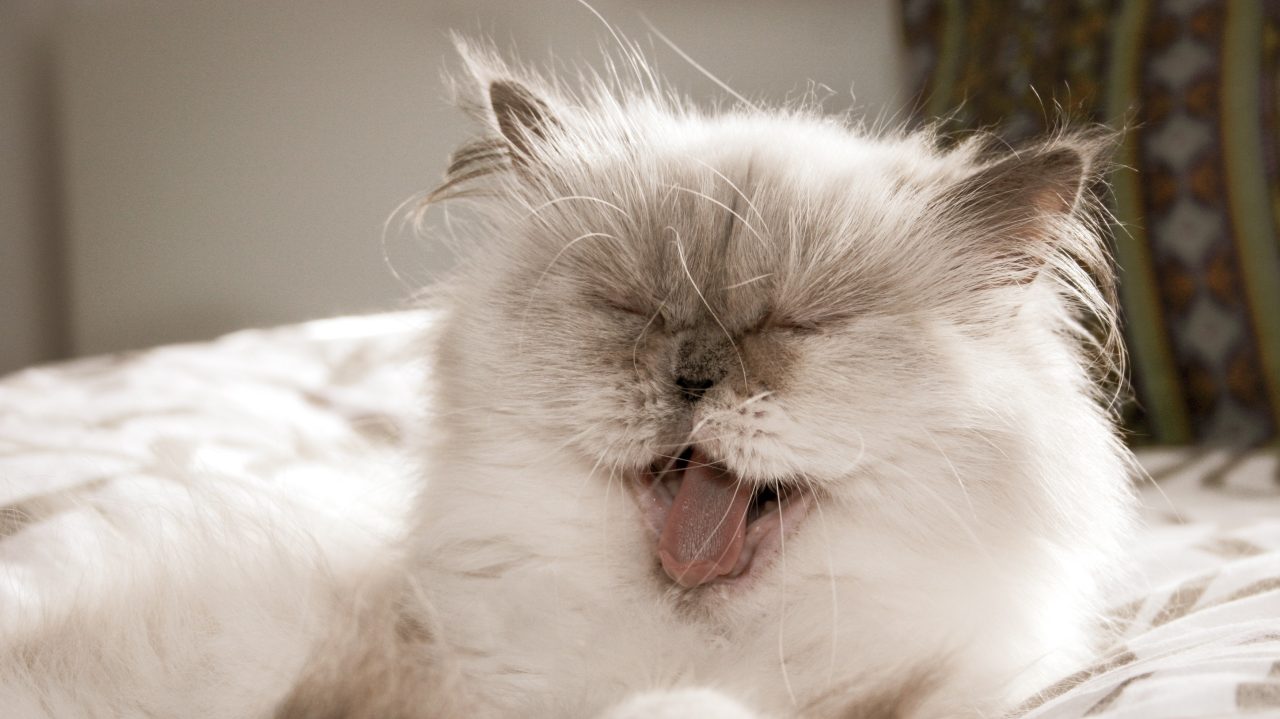
Brachycephalic cat breeds tend to snort more often than others. But what does brachycephalic mean? Well, these are all those felines that have flat faces and whose “head is shortened”. They have shorter facial and nose bones.
Because of that, the soft tissues of throats and noses are moved which can cause breathing problems. This also means that they are noisy breathers and that they can snore when they’re sleeping or purring on your lap.
They will also have slight breathing problems when exercising too much or walking uphill, for example. The air will flow fast through their little noses and that may sound like they’re in desperate need of some. This can last for a few minutes and is usually nothing dangerous.
Burmese, Scottish Folds, Himalayan, Exotic Shorthair, and Persian breeds are the ones prone to this since they are part of a flat-faced crew. However, you’ll be able to notice if your cat’s snorting is not normal. Especially if you notice that they have a discharge from their little noses, don’t hesitate to seek medical assistance.
2. She swallowed hairballs
Another reason that your cat is snorting can be hairballs. If she unintentionally swallowed one or two, she’ll try to spit it out. These attempts may be followed by snorting, gagging, and even coughing.
In case you can’t find the hairballs after she stops making sounds, it would be good to bring her for a quick check-up. I don’t want to scare you, but it’s better to be sure that your furbaby is good.
If your feline belongs to the group of those beautiful long-haired cats and you know she may have problems with hairballs, make sure you help her maintain her fur. Brush her often and serve her high-quality meals full of proteins, carbs, and fatty acids.
3. Something is stuck in her nose
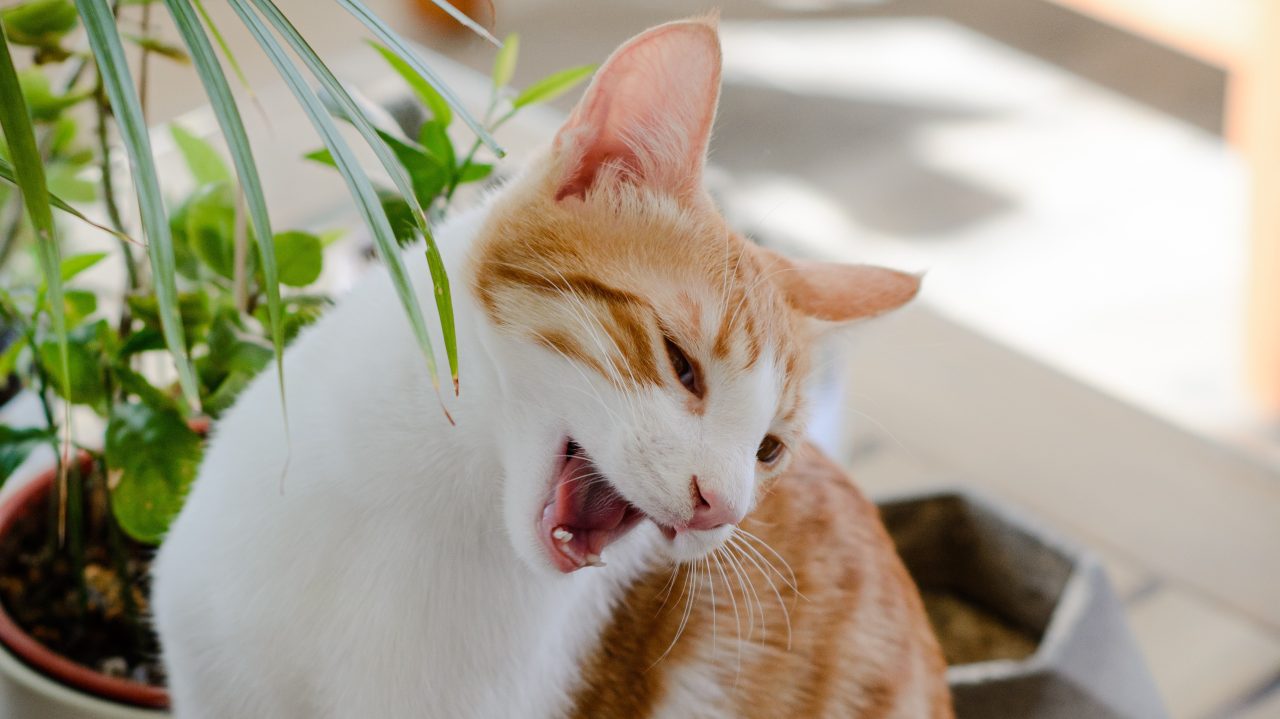
This is a big deal. If your cat is snorting because something is stuck in her nose and has a discharge at the same time, especially if it’s bloody, contact the vet as soon as possible. She may also touch her face with her paws and make movements like she’s trying to take something out.
All of this indicates that she has a foreign body inside her respiratory system. This happens from time to time when grass, seeds, cookie crumbs, or something similar ends up where it shouldn’t. She’ll probably sneeze a couple of times as well since her nasal passage is irritated.
4. She has allergies
Another thing that can reveal itself through nose irritation, sneezing, and snorting is your cat’s allergies. What is your cat allergic to? That’s what you’ll have to figure out. It could be some of the most common allergens human beings have a reaction to.
So, pollen, mold, dust, cleaning products, and different chemicals in air fresheners may be the culprits you’re looking for. Even though there are no particular ways to prevent allergic rhinitis, you can remove the source of it and treat the symptoms.
As soon as you notice a change in her breathing, or your cat starts snorting uncontrollably, consult with your vet and ask him for advice on what to do next.
5. It’s a warning sign
We both know that cats are territorial beings and sometimes when the intruder comes, they will start hissing and snorting. This is also their self-defense mechanism in case predators decide to attack. When she’s snorting, in this case, your cat will open her mouth and exhale sharply.
Kitties, as soon as they turn three months, can make a snorting sound. They enjoy testing the sounds they are capable of producing while they’re growing up. So, don’t be surprised to hear your cat snorting. She’s just checking what she’s capable of.
Is my cat snorting because she has some health issues?
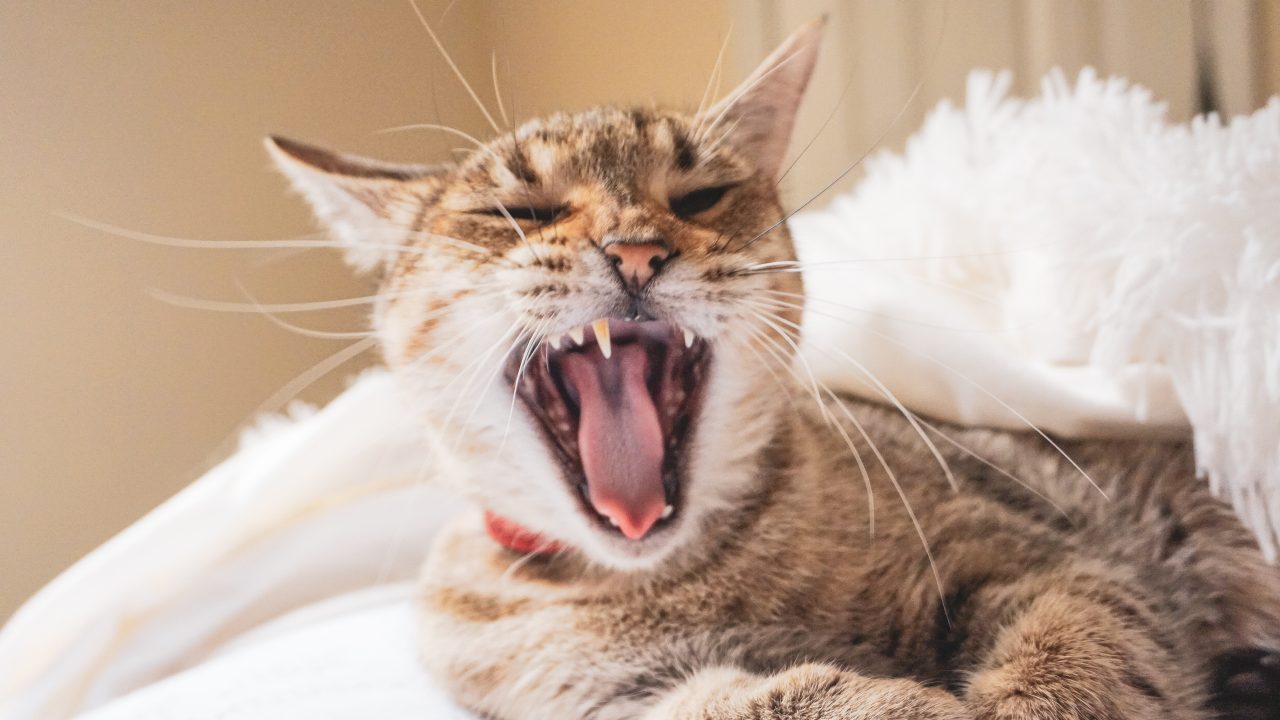
I know the whole situation may be confusing, but don’t panic right away. If your cat is snorting, that doesn’t necessarily mean she has health issues. As you previously noticed, most of the reasons she’s making that weird sound aren’t extremely dangerous.
However, your assumptions are good. Your feline may need a check-up in some cases. So, if you suspect that anything more serious could be in question, don’t wait long to book an appointment at your vet’s. Here are possible health problems your cat may have if she’s snorting often.
1. Asthma
If your cat is snorting while she’s breathing, she may have asthma. This may be the consequence of allergies in some cats. Their breathing system gets inflamed after being triggered by allergens and, therefore, felines have trouble breathing. If she starts breathing heavily, something’s definitely off.
Your feline will also start gasping for air and maybe even produce wheezing sounds. Consulting your vet right away would be the smartest choice, so don’t wait long to dial his number.
2. Dysphagia
I assume that you have no idea what this word means (unless you googled it of course), but don’t worry. I’ll help you out. It’s actually a medical term for a cat that has problems swallowing her food. The issues may appear in her mouth all the way to the end of her pharynx.
There are a couple of reasons why your feline is facing this problem and they include everything from not being able to open her mouth to tongue paralysis and different oral diseases. If your furbaby is tilting her head to the side in order to ingest that bite, something is wrong.
You’ll notice that she’s also gagging at food and that’s when your cat will start snorting in order to keep food and not throw up.
3. Cat flu
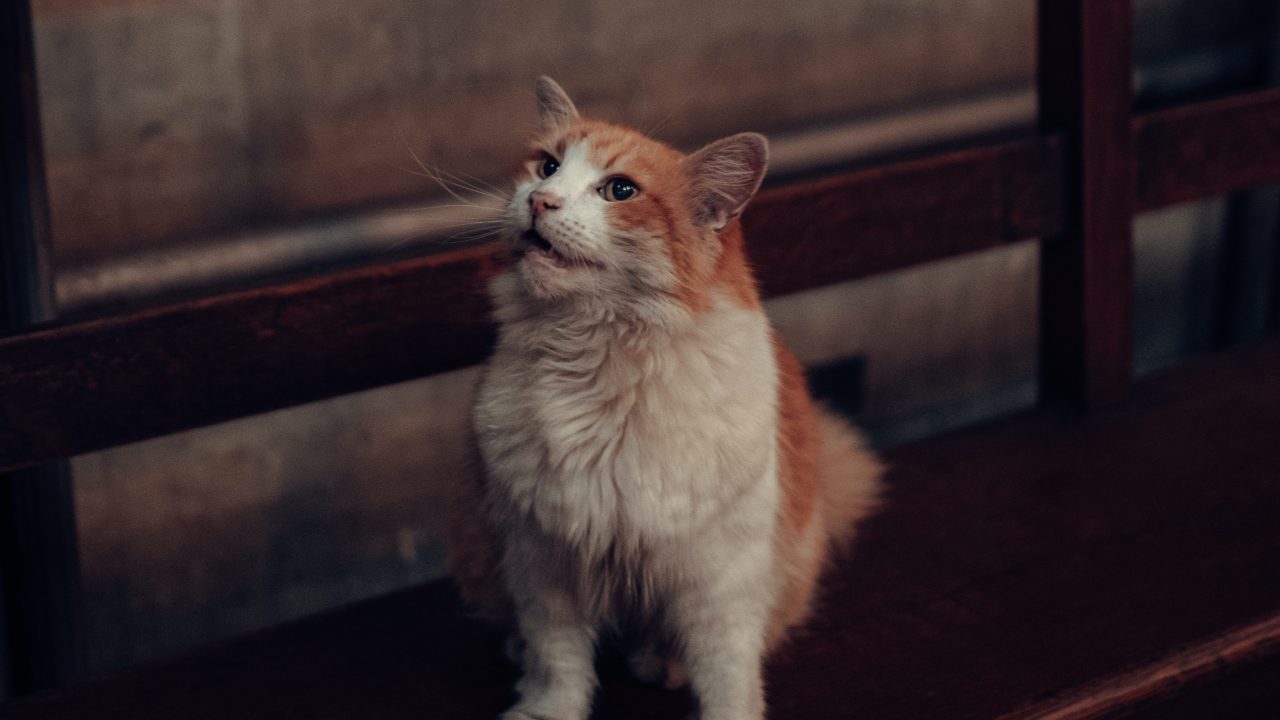
Usually, if your feline is having difficulty eating and swallowing her food, she probably has cat flu. A stuffed nose doesn’t let her breathe properly, so your cat may try snorting as her preferred method to help her with eating in those moments.
Respiratory diseases are mainly to blame for this, and she’ll need to be monitored. In case her condition gets worse, seek medical attention immediately.
4. Nasopharyngeal polyps
These polyps can develop in your feline’s middle ear or in the Eustachian tube. They are benign, but as they grow they can greatly impact a cat’s respiratory system. Nasopharyngeal polyps can block your furbaby’s cavity in the back of her mouth.
If that happens, your cat is going to make snorting sounds every time she exhales. In some cases, this may turn into an infection and your feline will have a nasal discharge and she’ll be sneezing. If the polyps end up in her earlobe, she may scratch her ear, or tilt her head sideways like she wants to get rid of them.
These nasopharyngeal polyps were noticed mostly in young cats before the age of one. However, they’re not so common, nor this is necessarily the problem that’s bothering your kitty.
5. Chronic rhinitis
An upper respiratory disease, also known as chronic rhinitis can be one of the reasons you’ll hear your cat snorting. A lot of mucus secretion will prevent your feline from breathing properly. It will simply block her nostrils and there won’t be a way for the air to come through.
This is an infection that will make your feline a bit lethargic and her eating habits will change too. If you suspect that your cat may be having rhinitis, take her to the vet and let him prescribe an adequate treatment.
6. Herpesvirus type 1
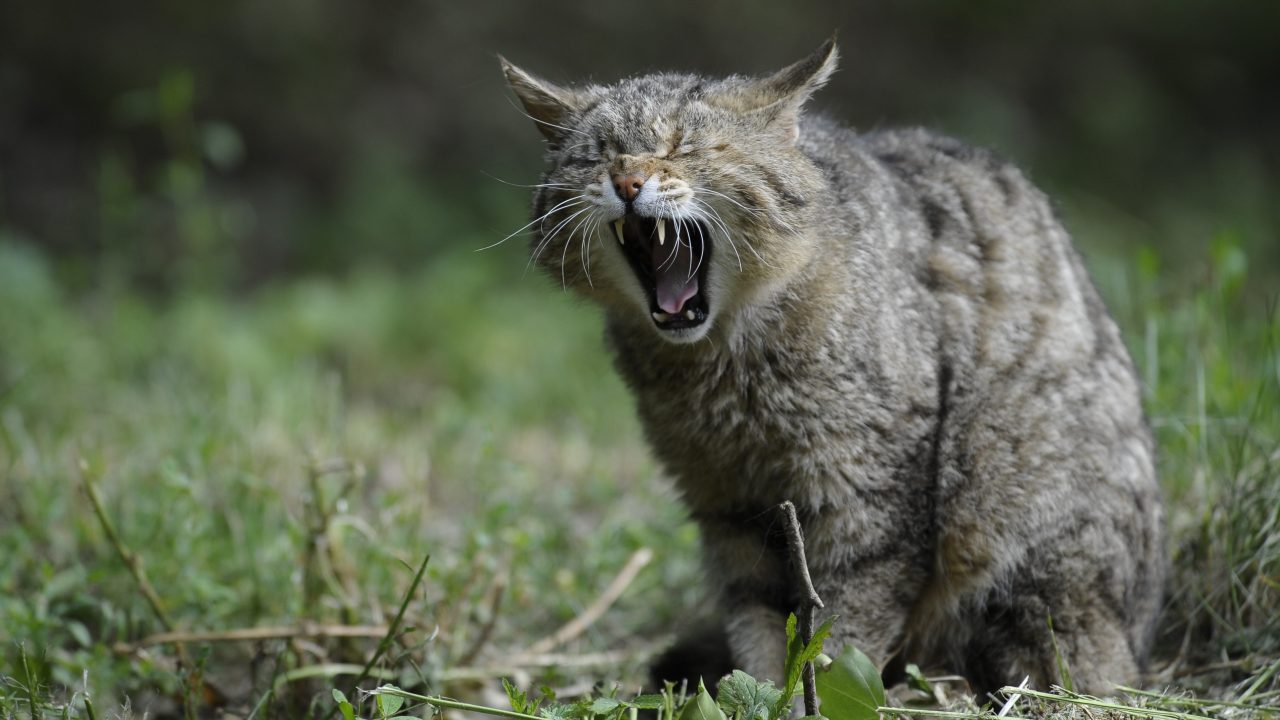
This virus is very dangerous for cats, especially because most of them are exposed to it. If your kitty was in a shelter, it’s possible that she got it there, or from her mother at birth. That makes her a carrier for life and she can, of course, infect other cats.
Fortunately, a vaccine can help here, so you don’t have to worry a lot. In case you suspect that your furbaby may have herpesvirus, separate her from other animals in the house and put on gloves when you’re touching her.
Keeping your kitty inside while she’s growing up may help her to avoid contact with cats that are already infected.
How can I prevent snorting in cats?
There are a couple of ways in which you can prevent snorting in cats. I hope you won’t need to try them all, but in case one doesn’t work, you have more on the list. So, what should you do to ease this problem? Here are some tips.
1. Keep her space dust-free
Since dust is one of the main allergens, it’s utterly important to keep her space dust-free. Also, make sure that her litter box is always clean and that she has no trouble using it. While she’s digging into her “toilet”, she’s going to move particles that may end up in her throat or nose.
Therefore, your cat may start snorting because there are some allergens that triggered her. Try using hypoallergenic litter if your feline is not used to the regular one.
2. Regularly clean your living space
As much as you have to take care of her living space, you have to clean yours too. There are a bunch of allergens in your surrounding that can make your cat snort. Remove them and make sure you regularly clean the dust around the house.
When you’re cleaning your place, make sure your feline is outside having fun, or in the other room, until everything is back to normal. Also, don’t use cleaning products that have harmful chemicals since those may actually cause more trouble.
3. Give her a bath
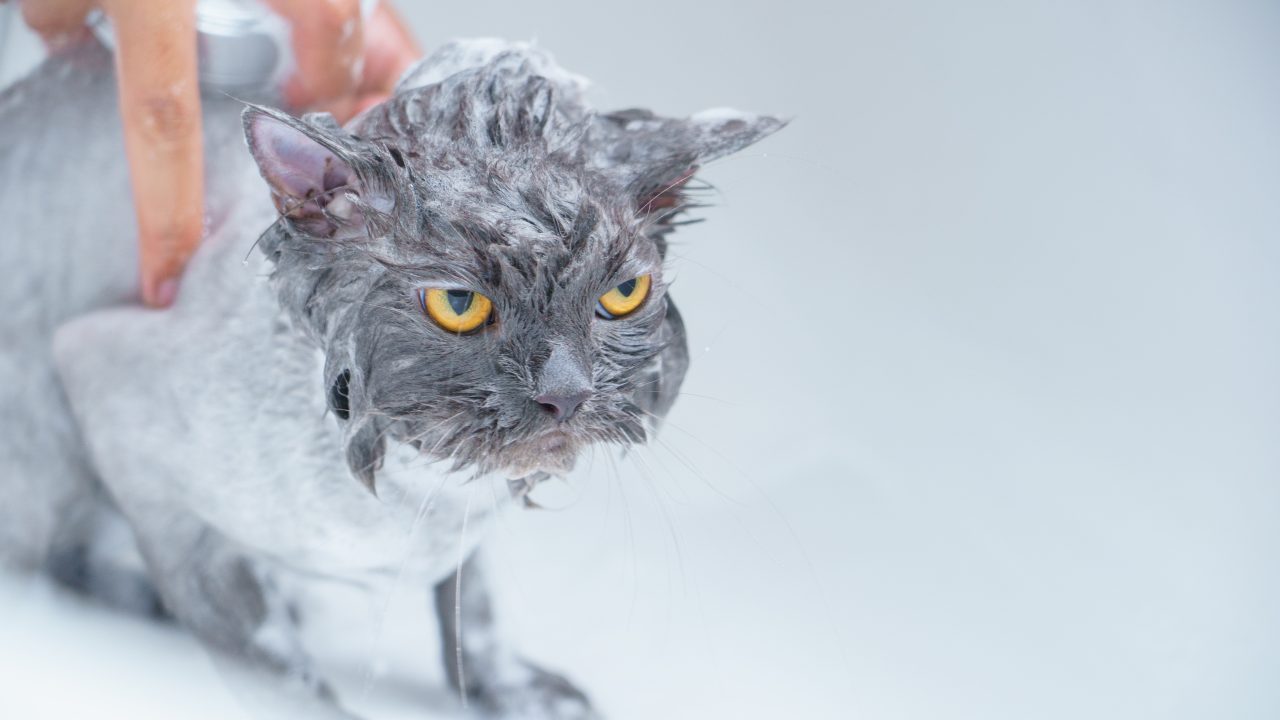
Some breeds will eagerly jump into that tub when you fill it with water, but the majority won’t. It’s up to you to train your kitty from a young age and slowly make her feel comfortable in the water. Occasional baths may help with a lot of problems, including snorting.
4. Use wet wipes
If your furbaby truly hates water and there’s nothing you can do to force her in that bathtub, then wet wipes are a perfect choice for you. Whenever she goes out to explore the neighborhood, clean her with them before she enters the home.
This way, you’ll help her in keeping her fur coat clean. You’ll take off possible allergens, and even create a safer environment for people who are allergic to cats. Perfect, isn’t it?
5. Steam nebulization
Have you heard about the term “steam nebulization”? That’s a technique that will help with your cat’s snorting. What am I talking about? Do you know how steam helps you unclog your nose when it’s stuffed? This is exactly what you’ll do for your cat!
Open up hot water in your bath, and close all doors and windows so she can’t run out. No, silly, you won’t put her in there. You’ll keep her close to you for comfort and let her breathe that humid air.
Try massaging her chest so the sinus congestion can leave her respiratory system. This will help her to start breathing normally. Don’t be surprised if she starts coughing, it’s a typical part of a coupage (this massaging technique that helps clear secretion from the lungs).
Sneezing, snorting, and snoring: What is the difference?
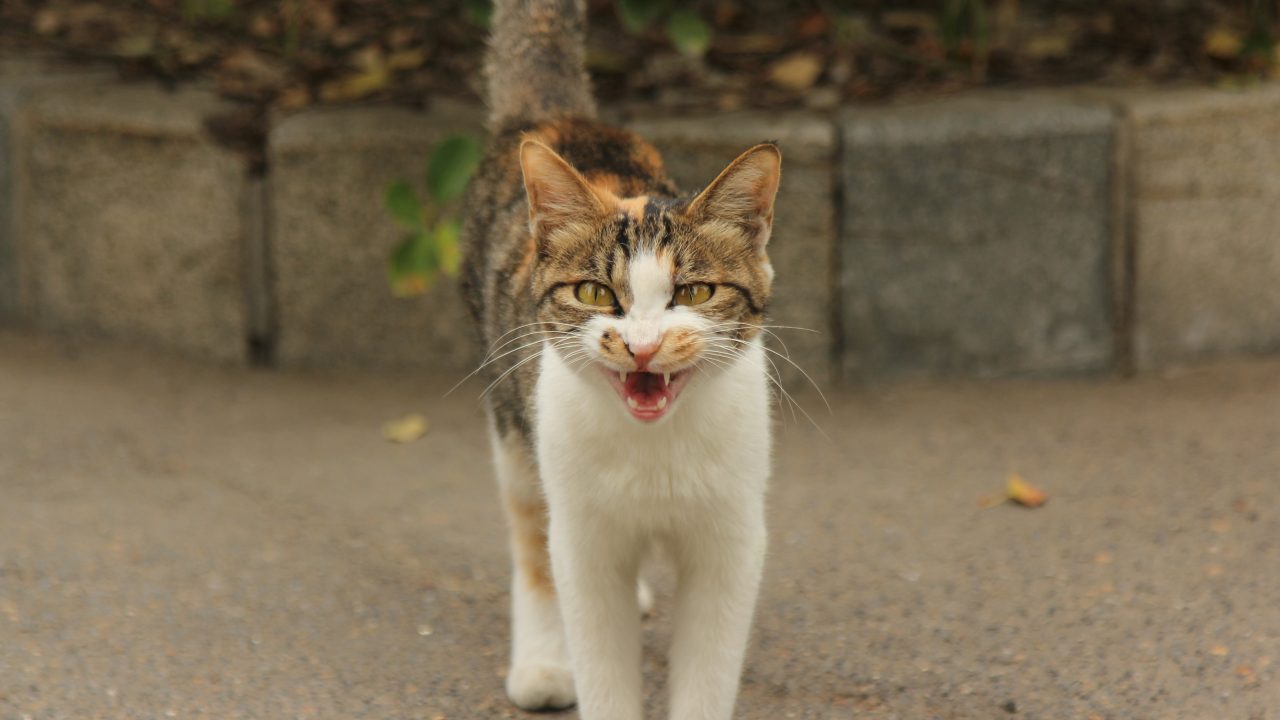
Perhaps you’ve been wondering how will you know if your cat is snorting, sneezing, or snoring when all of them sound pretty similar. Don’t worry, I’ll explain it to you now.
Sneezing is a sudden and automatic response to irritation in the upper respiratory system. The air bursts out from the lungs through the upper airways, aka her little nose. A simple tickle can cause it, or something more serious, like bacterial or viral infections.
Snorting, on the other hand, is a cat’s reaction to irritants. Because sneezing didn’t happen naturally, she’s trying to blow them out. Of course, it is similar to sneezing and both can be signs of some disease or infection, as we’ve previously mentioned.
When it comes to snoring, well, that’s a simple vibration of throat tissue, just like for us. Most animals snore from time to time, but because of their head shape like brachycephalic cat breeds, for example, some of them can have chronic problems related to snoring.
Final words
Of course, keeping your furbaby healthy should be your top priority. The easiest way to do that is to serve her meals that are highly nutritive and that have good quality. Also, provide her with enough playtime and toys, and don’t forget the cuddles!
I know that it can be scary to hear that loud and, most of the time, sudden noise, but it definitely sounds worse than it actually is. When it comes to your cat snorting, the most important thing, in this case, is not to panic.
The reason for this problem could be something completely harmful, but in case you’re extremely worried, consult your vet. I’ve mentioned a couple of ways to prevent snorting as well, so you can use them too. And, that’s about it my pawesome reader, see you next time!
